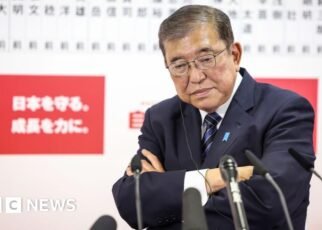[ad_1]
Japan’s prime minister Shigeru Ishiba has vowed to continue ruling the country despite a bruising loss suffered by his party at the general election.
The country now faces an uncertain political future as the coalition led by the long-ruling Liberal Democratic Party (LDP) has lost its majority in parliament, its worst result in over a decade.
Ishiba was sworn in as prime minister just this month after winning the leadership of his party. He had called a snap election to seal his mandate.
But in a speech on Monday, he admitted the LDP received “severe judgement” from voters, and added his party would “humbly accept” this.
“The Japanese people expressed their strong desire for the LDP to do some reflection and become a party that acts in line with the people’s will,” Ishiba told national broadcaster NHK.
The LDP and its much smaller coalition partner Komeito, have altogether taken 215 seats, falling short of the 233-seat majority needed to govern.
It is the first time the LDP has lost its parliamentary majority since 2009. The party has ruled Japan almost continuously since 1955.
The result comes after a tumultuous few years for the LDP which saw a cascade of scandals, widespread voter apathy and record-low approval ratings.
The party had seen approval ratings of below 20% earlier in the year, in the wake of a political fundraising corruption scandal.
Ishiba on Monday pledged to reform “enact fundamental reform regarding the issue of money and politics”.
“We need to answer to the people’s criticism. That is how I will take responsibility for the loss of the election,” he said.
He also promised to revitalise rural Japan and tackle inflation.
Japan’s parliament now has 30 days to convene and choose a prime minister. The chosen PM’s party or coalition, will form the government and can do so even without a majority of seats.
Ishiba said there are no plans to expand his political coalition at this stage. This raises the likely possibility that he will retain his premiership and his coalition will continue to rule Japan without a majority. But it also means they will no longer have the power to pass laws unilaterally.
Another possibility is that the opposition parties unite to form the government – the largest one, the Constitutional Democratic Party (CDP), won 148 seats up from 98 previously.
But that is a more unlikely scenario as Japan’s opposition parties historically have faced difficulty in uniting or convincing voters they are a viable option to govern.
The CDP had an approval rating of just 6.6% before parliament was dissolved.
Politics in Japan has been moving at a fast pace in recent months.
Ishiba took over as the country’s leader early this month following party elections held after his predecessor Fumio Kishida – who had been in the role since 2021 – made a surprise decision to step down in August.
The move to call the election came at a time when the LDP is desperate to restore its tarnished image among the public.
Chief among the series of scandals that have dogged the LDP is its relationship with the controversial Unification Church, described by critics as a “cult”, and the level of influence it had on lawmakers.
Then came the revelations of the slush funds scandal, with dozens of LDP lawmakers accused of pocketing proceeds from political fundraising events.
Those allegations, running into the millions of dollars, has led to the dissolution of powerful factions.
Additional reporting by Chika Nakayama
[ad_2]
Source link



